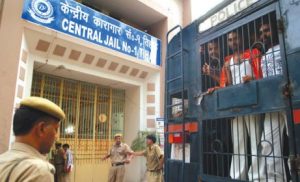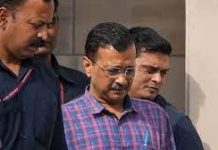 Each time I hear the present day talking about ‘development’, I wish we could get a peep into what’s been happening in the insides of our jails and prisons. Are traces or signs of development reaching in there ?
Each time I hear the present day talking about ‘development’, I wish we could get a peep into what’s been happening in the insides of our jails and prisons. Are traces or signs of development reaching in there ?
Yes, as citizens of the country we should know what is happening behind those high walls with the inmates languishing inside with cut-off from the world. Not to overlook this vital fact that almost seventy-five percent of the imprisoned are under-trials and technically innocent. Yet, they sit imprisoned for years at a stretch.
We cannot ignore this fact that how ‘framed’ men and women spends years as under-trials in the Indian jails and prisons until they were proven innocent and released by Court orders. In fact, this July 2019, five Kashmiri prisoners were released after 23 years of imprisonment without any bail or parole, the Rajasthan High Court on July 23 declared them innocent and ordered their release.
Frustrated and disgusted with the system, many try to break free only to be imprisoned once again. We haven’t even bothered to study ‘why’ inmates try to break free, try their utmost to run away from prison hellholes. Perhaps, they are unable to cope with the overdose of jail life and cannot pick up the courage to talk about the trauma and stress they undergo. Talk to whom? To the Jailers who are perhaps themselves bound by the ruthlessness in the very system?
Tell me, where’s the required focus on the jails and on those languishing in jails? If the political rulers would have tried to connect with the jailed inmates, at least in terms of reforms, life of the prisoners would have been improved by now. There should have been expansion of the very concept and idea of open jails. Let the jailed men and women breath fresh air. Though they have committed crimes it does not give the state the sanction to throttle them.
Way back in 2003, the then chairman of National Human Rights Commission, Justice AS Anand, had focused on the dismal conditions of the jails and inmates had faced. During my interviews with him, he had detailed the congestion cum overcrowding in prisons, also the trauma faced by the under-trials because of the delay and hurdles in getting bail.
To quote Justice AS Anand from an interview given to me in 2003, “Yes, nearly 75 percent of our jail population consists of under-trials, many of whom are innocent. A large number of under-trials languish in jails even after they are granted bail because they are unable to raise the surety amount. In this context, we should consider the release of under-trials on personal bonds.”
Justice Anand had also focused on the plight of the women prisoners. He had mentioned about two specific jails where women prisoners complained of the unavailability of sanitary napkins leading to poor menstrual hygiene.
Shouldn’t we, the not-so-jailed question that why jails and prisons are not getting developed and spruced up along the development propaganda? Where is the transparency in the treatment meted out to the jailed? Why shouldn’t non-governmental agencies are not allowed to carry out investigative probes? How is it getting easy for the police and agencies to arrest an innocent and frame charges on him due to which the person languishes as an under-trial for many years? Why are details of the under –trials not probed by an independent agency or a watchdog group?
Can there be some degree (not third degree) of transparency to what’s taking place inside those high walls? Also, how I wish that several of the jailed political prisoners of the day to write details on what’s taking place in their jails, their jailed life. Let’s not overlook the fact that in those yesteryears, best works were authored by the political prisoners when they sat in jails.
Let us not bypass the core fact to the jailed – they are a part and parcel of the society and system that is only furthering the crime graph and not lessening it. Aren’t we, as a collective lot, to be blamed for this. Aren’t many amongst us pushing the vulnerable towards crime and violence? Why aren’t we giving as much focus to the jailed lot as we are giving to the not- so – jailed amongst us?
This brings me to focus on another connected aspect – Where are the prison diaries of the day? Why don’t political prisoners write diaries, so that we know what’s taking place in those hell holes? Are prisoners of the day discouraged from offloading their everyday experiences or inner most thoughts and emotions? Are these ‘caged’ men and women reduced to such levels of hopelessness that they do not want to pen down? Why computers and laptops are not available in the prisons in the times of ‘development’? Also, is there any basic freedom for the imprisoned to write fearlessly and freely?
One of the recent books that I have read recently is ‘Prison Days’(Speaking Tiger) by Vijaya Lakshmi Pandit, with a foreword by her daughter, Nayantara Sahgal. This prison diary was written by her in the early1940s and as one reads through, ground realities of that historic phase stands out. Focus on the hundreds of people who were imprisoned by the British. And, these included Pandit Jawaharlal Nehru and members of his family.
To quote Nayantara Sahgal from the foreword: “My mother, Vijaya Lakshmi Pandit, wrote this prison diary during her third and last imprisonment under British rule. It begins on 12 August 1942, six days before her forty-second birthday. World War11 was on, Allahabad, like the rest of the country was under military rule. Arrest and imprisonment took place without trial. Several lorries filled with armed policemen arrived that night at Anand Bhawan at 2 a.m. to arrest one lone, unarmed woman, who, along with her husband, Ranjit Sitaram Pandit, and her brother Jawaharlal Nehru, had committed her life to the non-violent fight to free India from British rule under the leadership of Mahatma Gandhi…My father was already a prisoner in the Naini Central jail in Allahabad, where she was taken, and he would later be transferred to a jail in Bareilly, where he would fall mortally ill, and finally be released only to die. My uncle was imprisoned ‘somewhere in India’. It was not made public until much later that he and other leaders of the Indian National Congress were held in the Ahmednagar Fort. My older sister, Chandralekha, aged eighteen and my cousin, Indira Gandhi, aged twenty-five, were arrested later and taken to Naini Jail.”
In this book, there is no mention of physical tortures inflicted on Vijaya Lakshmi Pandit but then as she writes in the preface, “This little diary does not attempt to record all the events which took place during my last term of imprisonment… the treatment given to me and to those shared the barrack with me was according to the prison standards, very lenient – the reader must not imagine that others were equally well treated. When the truth about that unhappy period is made known many grim stories will come to light, but that time is still far away.”
One would wonder after reading through this book that there is an attempt by the present rulers of the day to bypass the role played by Nehru’s entire clan in the freedom struggle of this country. Should the rulers of the day intrude into our history and trample upon the crusade undertaken by the who’s who of that era to fight the British till we attained our freedom? Can the country’s history and historical turns be twisted by narrow political whims and fancies?
And, how I wish the inmates languishing in India’s prisons to pen diaries on their life accounts.
Several books have been written by the former prisoners in these recent years on disparities and biases that dominate life behind the high walls. These books bare harsh ‘jail’ truths. Must reads are – Anjum Zamarud Habib’s ‘Prisoner No. 100’ (Zubaan) ,Mohammad Aamir Khan’s ‘Framed As A Terrorist’( Speaking Tiger) Abdul Wahid Shaikh’s Begunah Qaidi (Pharos Media), Mufti Abdul Qayyum Ahmad Husain Mansuri’s ‘I Am A Mufti &I Am Not A Terrorist – 11 Years Behind the Bars ’ (Published by Jamat Ulama Ahmedabad and Maharashtra), Iftikhar Gilani’s ‘My Days in Prison’ (Penguin ).













